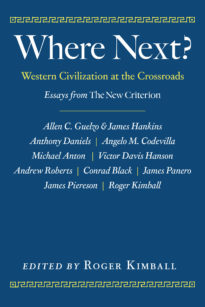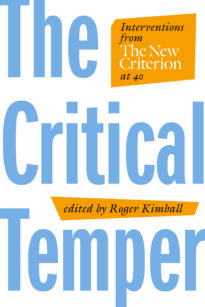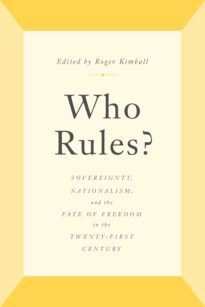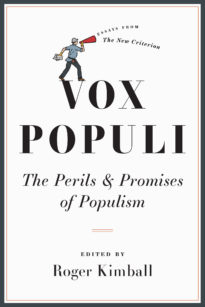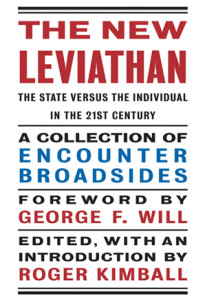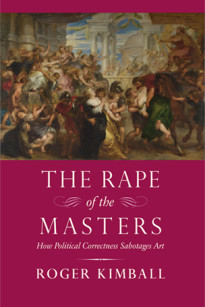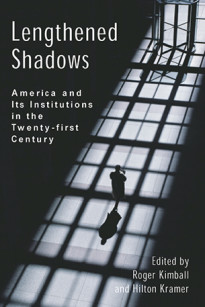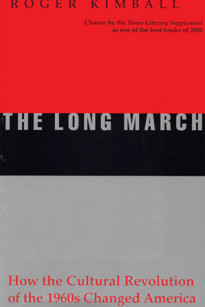Free shipping on all orders over $40
ROGER KIMBALL is President and Publisher of Encounter Books and Editor and Publisher of The New Criterion. He writes regular columns for American Greatness, The Epoch Times, and The Spectator, US edition. Mr. Kimball lectures widely and has appeared on national radio and television programs as well as the BBC.
Mr. Kimball is the author of The Fortunes of Permanence: Culture and Anarchy in an Age of Amnesia (St. Augustine’s Press, 2012), The Rape of the Masters: How Political Correctness Sabotages Art (Encounter Books), Lives of the Mind: The Use and Abuse of Intelligence from Hegel to Wodehouse (Ivan R. Dee), and Art’s Prospect: The Challenge of Tradition in an Age of Celebrity (Ivan R. Dee). Other titles by Mr. Kimball include The Long March: How the Cultural Revolution of the 1960s Changed America(Encounter) and Experiments Against Reality: The Fate of Culture in the Postmodern Age (Ivan R. Dee). Mr. Kimball is also the author of Tenured Radicals: How Politics Has Corrupted Our Higher Education (HarperCollins). A new edition of Tenured Radicals, revised and expanded, was published by Ivan R. Dee in 2008.
Mr. Kimball has contributed to many publications here and abroad, including The New Criterion, The Times Literary Supplement, Modern Painters, Literary Review, The Wall Street Journal, The Public Interest, Commentary, The Spectator, The New York Times Book Review, The Sunday Telegraph, The American Spectator, The Weekly Standard, National Review, Quadrant, The National Interest, and Weltwoche.
Mr. Kimball is also a contributor to and co-editor, with Hilton Kramer, of Against the Grain: The New Criterion on Art and Intellect at the End of the Twentieth Century, The Future of the European Past: Essays from The New Criterion, The Betrayal of Liberalism: How the Disciples of Freedom and Equality Helped Foster the Illiberal Politics of Coercion and Control, The Survival of Culture: Permanent Values in a Virtual Age, Lengthened Shadows: America and Its Institutions in the Twenty-First Century, and Counterpoints: 25 Years of The New Criterion on Culture and the Arts all of which are published by Ivan R. Dee. He also edited and contributed to Who Rules? Sovereignty, Nationalism, and the Fate of Freedom in the Twenty-first Century (Encounter Books), Vox Populi: The Perils and Promises of Populism (Encounter Books). In addition, Mr. Kimball edited and provided introductions to an edition of Walter Bagehot’s Physics and Politics: Or, Thoughts on the Application of the Principles of “Natural Selection” and “Inheritance” to Political Society (Ivan R. Dee), Against the Idols of the Age (Transaction), an anthology of writings by the Australian philosopher David Stove, and Athwart History: Half a Century of Polemics, Animadversions, and Illuminations: A William F. Buckley Jr. Omnibus.
Mr. Kimball has served on the Board of Advisors of the Gilder-Lehrman Institute of American History, the Board of Visitors and Governors of St. John’s College, Annapolis and Santa Fe, and Transaction Publishers. He currently serves on the board of the Manhattan Institute for Policy Research and is Chairman of the William F. Buckley Jr. Program at Yale. He is the recipient of a Bradley Prize from the Lynde and Harry Bradley Foundation and the Thomas L. Phillips Career Achievement Award from the Fund for American Studies, both in 2019
Titles by this Author
-
Read More
Featuring contributions by Conrad Black, Victor Davis Hanson, Roger Kimball, Andrew Roberts, and other luminaries, this book collects the ten special essays from The New Criterion’s fortieth-anniversary season to assess where Western civilization is now, and where it’s going.
- $27.99
- Add to Cart
-
Read More
On the occasion of its fortieth anniversary, The New Criterion has brought together a winning collection of essays demonstrating the range and acuity that has established the magazine as America’s foremost review of culture and the arts. Edited by Roger Kimball, this spiritual Baedeker is a timely repository of timeless writing about the figures, controversies, and challenges that define our life in the first decades of the twenty-first century.
- $39.99
- Add to Cart
-
Read More
The populist phenomenon is often identified with the election of Donald Trump in November 2016. But the political, moral, and social realities for which Trump was a symbol both predated his candidacy and achieved independent fulfillment in countries as disparate as the United Kingdom, Hungary, and Brazil.
- $22.50
- Add to Cart
-
Read More
The rise of populist movements across the political spectrum poses a vital question: what role should populism play in modern democracy? In ten trenchant essays, the writers of The New Criterion examine the perils and promises of populism in Vox Populi, a new collection that marks the thirty-fifth anniversary of this critical journal.
- $23.99
- Add to Cart
-
Read More
The ideas and policies that are percolating down from 1600 Pennsylvania Avenue and Capitol Hill—increased government intervention, calls to “spread the wealth around,” onerous regulations, and bailouts for all—are not new. We’ve been down this road before. We know where it leads.
- $25.99
- Add to Cart
-
Read More
The Rape of the Masters exposes the charlatanry that fuels much academic art history and leaks into the art world generally, affecting galleries, museums and catalogues. It also provides an engaging antidote to the tendentious, politically motivated assaults on our treasured sources of culture and civilization.
- $17.95
- Add to Cart
-
Read More
In a series of penetrating reflections on the United States and its institutions in the post-9/11 world, this book offers some answers to questions that people at home and abroad have begun to ask about our country. How did it attain its international preeminence? What exactly is this richest, most powerful of countries made of? Where will its unmatched influence lead?
- $17.95
- Add to Cart
-
Read More
In The Long March, Roger Kimball, the author of Tenured Radicals, shows how the “cultural revolution” of the 1960s and ’70s took hold in America, lodging in our hearts and minds, and affecting our innermost assumptions about what counts as the good life. Kimball believes that the counterculture transformed high culture as well as our everyday life in terms of attitudes toward self and country, sex and drugs, and manners and morality.
- $16.95
- Add to Cart

